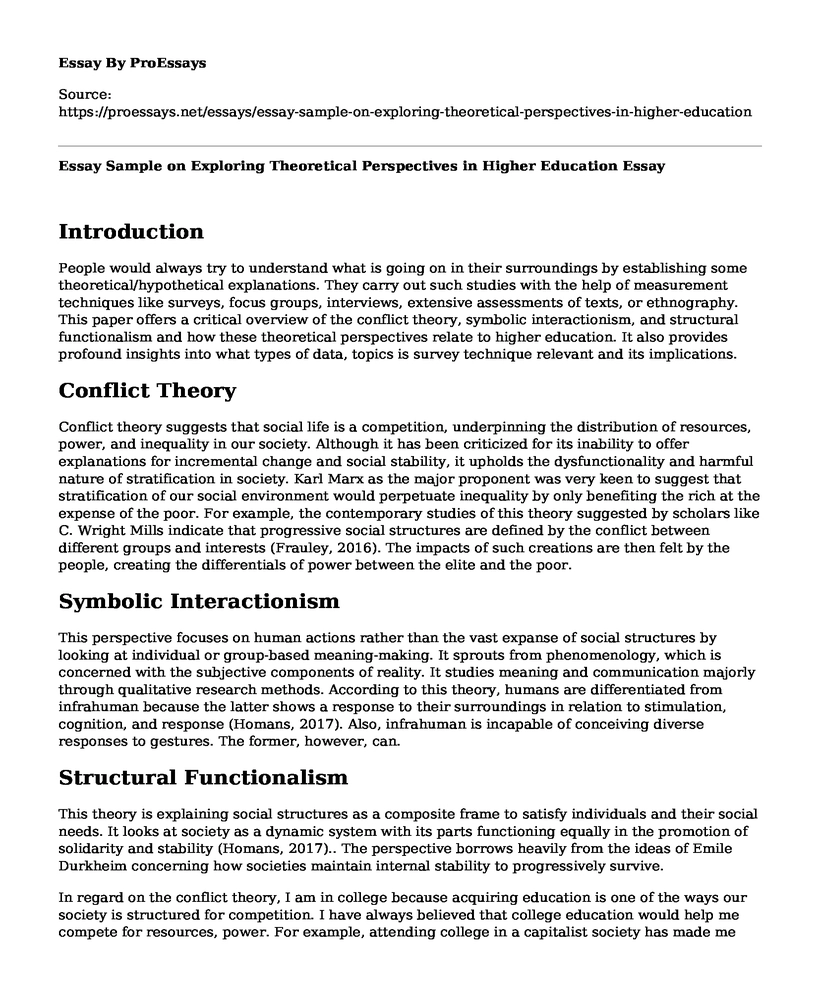Introduction
People would always try to understand what is going on in their surroundings by establishing some theoretical/hypothetical explanations. They carry out such studies with the help of measurement techniques like surveys, focus groups, interviews, extensive assessments of texts, or ethnography. This paper offers a critical overview of the conflict theory, symbolic interactionism, and structural functionalism and how these theoretical perspectives relate to higher education. It also provides profound insights into what types of data, topics is survey technique relevant and its implications.
Conflict Theory
Conflict theory suggests that social life is a competition, underpinning the distribution of resources, power, and inequality in our society. Although it has been criticized for its inability to offer explanations for incremental change and social stability, it upholds the dysfunctionality and harmful nature of stratification in society. Karl Marx as the major proponent was very keen to suggest that stratification of our social environment would perpetuate inequality by only benefiting the rich at the expense of the poor. For example, the contemporary studies of this theory suggested by scholars like C. Wright Mills indicate that progressive social structures are defined by the conflict between different groups and interests (Frauley, 2016). The impacts of such creations are then felt by the people, creating the differentials of power between the elite and the poor.
Symbolic Interactionism
This perspective focuses on human actions rather than the vast expanse of social structures by looking at individual or group-based meaning-making. It sprouts from phenomenology, which is concerned with the subjective components of reality. It studies meaning and communication majorly through qualitative research methods. According to this theory, humans are differentiated from infrahuman because the latter shows a response to their surroundings in relation to stimulation, cognition, and response (Homans, 2017). Also, infrahuman is incapable of conceiving diverse responses to gestures. The former, however, can.
Structural Functionalism
This theory is explaining social structures as a composite frame to satisfy individuals and their social needs. It looks at society as a dynamic system with its parts functioning equally in the promotion of solidarity and stability (Homans, 2017).. The perspective borrows heavily from the ideas of Emile Durkheim concerning how societies maintain internal stability to progressively survive.
In regard on the conflict theory, I am in college because acquiring education is one of the ways our society is structured for competition. I have always believed that college education would help me compete for resources, power. For example, attending college in a capitalist society has made me appreciate the essence of competition through competitive learning in classrooms, and through activities like sporting and debates in college. I have always seen education not only as a tool for social benefit but also as a powerful means of power acquisition and maintenance.
Also, I am in college based on the perspective of symbolic interactionism because of the interactions with the teachers and how their expectations have helped me perform and maintain the best perceptions and attitudes towards college. I am in college based on structural factionalism because I want to discover how college education serves my community and how its various roles manifest within the society.
Besides, of the three perspectives, structural functionalism explains best why I'm pursuing higher education. The best value that inspired me to pursue higher education is the role of education in our society, its advocacy for liberty rights, independent actions, and competition. Through education, it is unavoidable that I would build on my social capital and interpersonal relationships that would translate into professionalism.
Survey, as a measurement technique in sociological research, can be used to gather opinions, knowledge, or behavior. It is always in the form of written questionnaires, telephone interviews, face-to-face, electronic mails, or focus groups on topics like conflict and crime (Szalai et al., 2016). The major drawbacks with regards to this technique are; the participants might be biased and might not offer honest and accurate answers; they may also feel insecure and discouraged to provide solutions that are not presenting themselves favorably.
Finally, according to a recent survey I completed regarding how sociological perspectives like structural-functionalism impact on higher education, the following are some of the ways I think it might be improved. Firstly, ensuring that every question is relevant, secondly, keeping the question short and straightforward to eliminate boredom, and lastly, asking direct questions among others.
References
Frauley, J. (2016). C. Wright Mills and the Criminological Imagination: Introductory Remarks. In C. Wright Mills and the Criminological Imagination (pp. 1-18). Routledge.
Homans, G. C. (2017). Contemporary theory in sociology. In Sociological Methods (pp. 51-69). Routledge.
Szalai, A., Petrella, R., & Rokkan, S. (Eds.). (2016). Cross-national comparative survey research: theory and practice. Elsevier.
Cite this page
Essay Sample on Exploring Theoretical Perspectives in Higher Education. (2023, May 09). Retrieved from https://proessays.net/essays/essay-sample-on-exploring-theoretical-perspectives-in-higher-education
If you are the original author of this essay and no longer wish to have it published on the ProEssays website, please click below to request its removal:
- Learning English as a Foreign Language in Saudi Arabia
- Mind Your Faith Book Review Paper Example
- Using Feminist Ideas to Raise Boys Who Are Not Misogynists Essay
- Translators: Balancing Acceptability and Accuracy - Research Paper
- Essay on Bullying: A Common Yet Damaging Form of School Violence
- Motivating Students: Key Role of Teachers & Parents - Essay Sample
- Schools: Building Cohesive Environments to Prevent Shootings - Essay Sample







